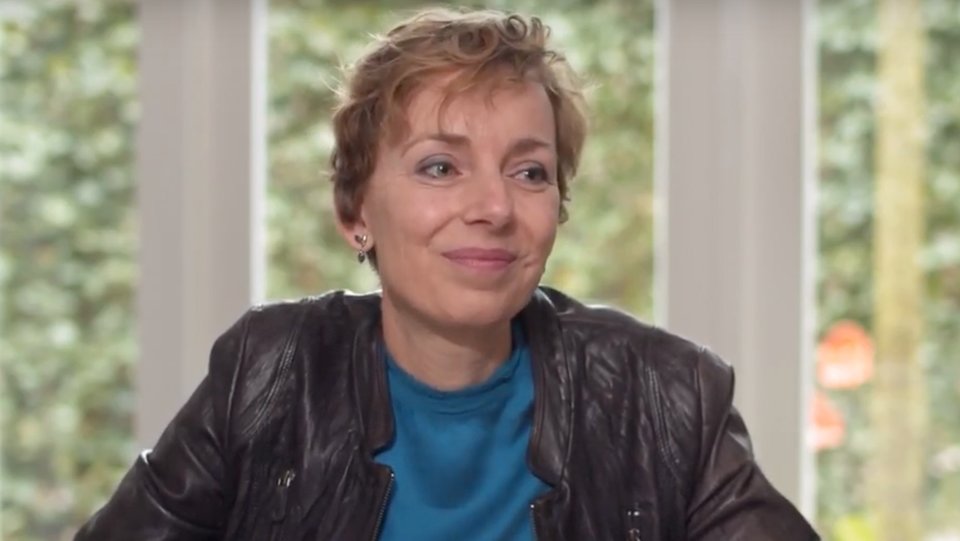#Eureka
What kept us busy these past months? Below you will read more about the scientific progress we made on our way to outsmarting cancer and impacting lives. Read about our cutting-edge research, the events we organised and how we include the patient’s voice in our work.
Events: social interaction through science
Collaboration instead of competition, that’s what Oncode is all about. To facilitate knowledge sharing and collaboration, we organize various workshops, masterclasses and other events throughout the year.
Read more...
New
Valorization Director at
Oncode Institute
Oncode Institute announced that its Supervisory Board has appointed Chris De Jonghe as Valorization Director. Chris will start at Oncode Institute on May 4th and assumes her role as Valorization Director and all responsibilities on June 1st.
Read more...
World
cancer day
February 4th marked world cancer day. We spoke with Erica van Wuijtswinkel, patient representative at Oncode's Supervisory Board, about the importance of patient engagement within cancer research. During the interview, she also discussed her role at Oncode Institute and how Oncode incorporates patient engagement.
Read more...
Oncode researchers
gain access
to Organoid technology
Thanks to an agreement between the Royal Netherlands Academy of Arts and Sciences (KNAW) and Oncode Institute, organoid technology will become available to all 800+ cancer researchers that are part of Oncode.
Read more...
Science
is not a competition, but...
We are always pleased to share exciting news about the prestigious awards, grants, or other forms of recognition our excellent scientists receive. We have listed some highlights of the past months.
Read more...
Publication highlights
Innovative ways to treat cancer patients, start with basic science. New insights from our labs find their way into the scientific community every day. We like to share a few publication highlights of the last few months.
Read more...

#Eureka
Events: social interaction through science
Collaboration instead of competition, that’s what Oncode is all about. To facilitate knowledge sharing and collaboration, we organize various workshops, masterclasses and other events throughout the year.
Last November, we organised another 2-day event at the Royal Tropical Institute (KIT) for researchers. Make sure to read the event report.
We organised another clinical workshop, this time with the focus on glioblastoma. The goal was to present current trends in clinical research, explore how basic research can address unmet clinical needs and stimulate new collaborations (translational and clinical) that could be eligible for Oncode funding. Read the full report.
In addition to science events, we also co-hosted an industry event with HollandBio. Oncode Institute and HollandBio brought together academia, life sciences companies, clinicians and other relevant stakeholders to discuss new frontiers in cell therapy. Read the full event report.
#Eureka
Publication highlights
Innovative ways to treat cancer patients, start with basic science. New insights from our labs find their way into the scientific community every day. We like to share a few publication highlights of the last few months.
The teams of Jeroen de Ridder (UMC Utrecht) and Wouter de Laat (Hubrecht Institute) published a protocol about multi-contact-4c technology which enables researchers to identify 3D interactions between regions in the genome. The 3D organization of the genome is an important aspect when it comes to regulation of gene expression and cell homeostasis. By implementing third generation DNA sequencing, long DNA fragments can be analysed as compared to existing techniques. Read more in Nature Protocols.
The labs of Puck Knipscheer (Hubrecht Institute) and Roland Kanaar (Erasmus MC) joined forces to shed new light on the role of the BRCA2 interacting protein HSF2BP. BRCA2 is involved in the repair of different types of DNA damage and accumulation of DNA damage is seen in many cancers. Aberrant levels of HSF2BP lead to impaired repair of DNA damage. This may be a source of cancer-promoting genomic instability and also a targetable vulnerability in cancer cells. Read more about their work in Nucleic Acids Research.
In an exciting collaboration, the labs of Emile Voest (NKI), Hans Clevers (Brecht Institute), Edwin Cuppen (UMC Utrecht) and Lodewyk Wessels (NKI) looked into the predictive value of drug responses in patient derived organoid cultures. Their work shows that the response to a drug used in the treatment of metastasised colorectal cancer correlates well with the in vitro response in organoids. This opens up opportunities to personalized treatment plans, read more in Science Translational Medicine.
A lot of our work focuses on the potency of the immune system in combating cancer. The latest work of Jannie Borst (LUMC) and Lodewyk Wessels (NKI) reveals new insights in the interplay between different types of immune cells. The memory of the immune system, which enables it to remember which pathogens to fight, is organized through a highly regulated interaction between different types of T-cells. CD4+ T-cells and CD8+. Read their article in Nature Communications to find out more.
Are you curious about all the scientific output our researchers have produced? Please have a look.
#Eureka
World cancer day
February 4th marked world cancer day. We spoke with Erica van Wuijtswinkel, patient representative at Oncode's Supervisory Board, about the importance of patient engagement within cancer research. During the interview, she also discussed her role at Oncode Institute and how Oncode incorporates patient engagement.
#Eureka
Oncode researchers gain access to Organoid technology thanks to collaboration with KNAW
Thanks to an agreement between the Royal Netherlands Academy of Arts and Sciences (KNAW) and Oncode Institute, organoid technology will become available to all 800+ cancer researchers that are part of Oncode. The KNAW collaborates with its institutional partner UMC Utrecht on organoid technology. Thanks to the agreement with Oncode, researchers receive a license to conduct research on organoids for the first time in the Netherlands. Read more about this
#Eureka
Science is not a competition, but...
We are always pleased to share exciting news about the prestigious awards, grants, or other forms of recognition our excellent scientists receive. We have listed some highlights of the past months.
Sjaak Neefjes (LUMC) won the prestigious Josephine Nefkens Award for cancer research. The jury praises Neefjes' research activities and describes him as an out-of-the-box thinking, passionate and socially oriented researcher.
Sylvie Noordermeer (LUMC) won the LUMC C.J. Kok Award for contributing tremendously to her field in the last year.
Anne Rios (Princess Máxima Center) received the St. Baldrick’s Robert J. Arceci Innovation Award at the annual SIOP congress in Lyon, France. This was the first time the award has gone to the Netherlands.
Jurgen Marteijn, Wim Vermeulen, Roland Kanaar, Jan Hoeijmakers and Miao-Ping Chien (all Erasmus MC) won the first Ammodo Science Award for groundbreaking research. (photo)
Elzo de Wit (NKI) and Ruben van Boxtel (Princess Máxima Center) both received the ERC Consolidator Grant. The ERC Consolidator Grants are awarded to outstanding researchers with at least seven and up to twelve years of experience after obtaining their PhD, and a scientific track record showing great promise.
#Eureka
Oncode Institute appoints Chris De Jonghe as its new Valorization Director
Oncode Institute announced that its Supervisory Board has appointed Chris De Jonghe as Valorization Director. Chris will start at Oncode Institute on May 4th and assumes her role as Valorization Director and all responsibilities on June 1st. Angus Livingstone, Oncode’s founding Valorization Director will stay with Oncode Institute until May 31st. Chris has a wealth of multi-disciplinary experience in the life sciences sector. Read more

